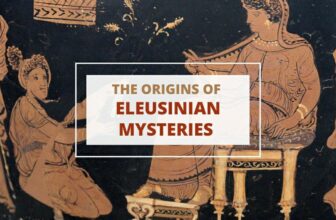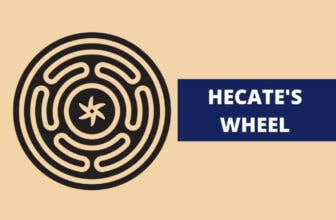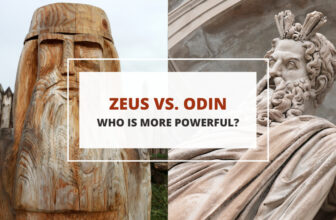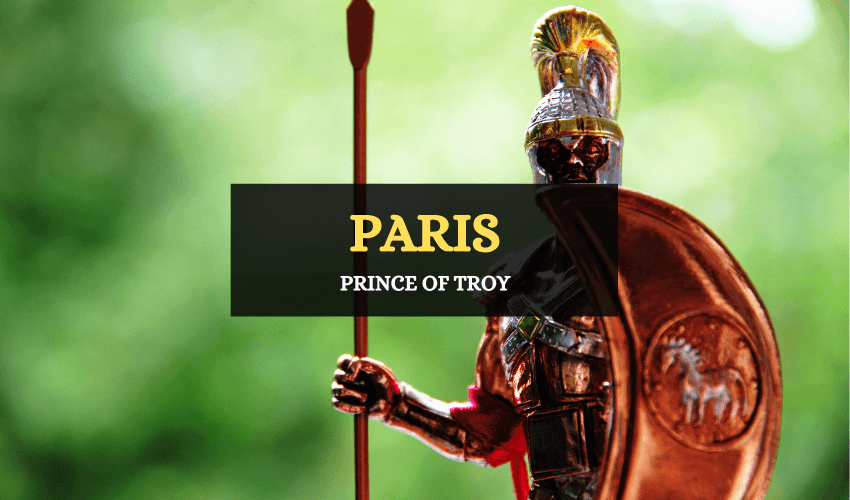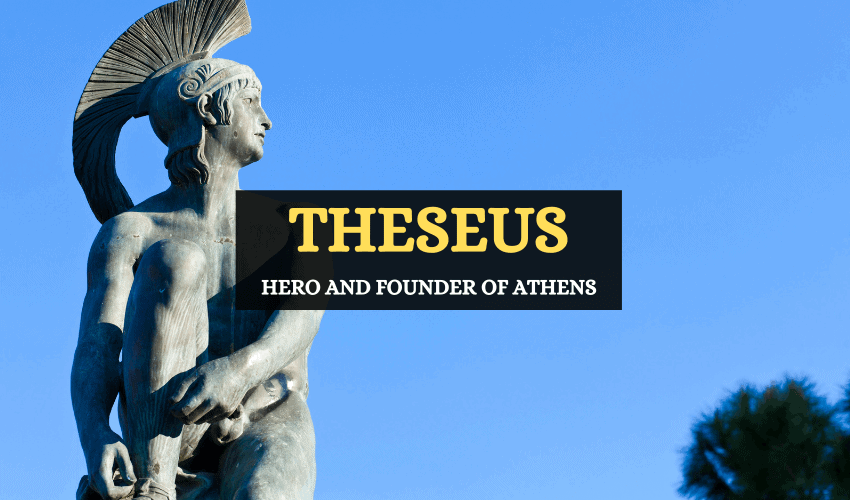
Table of Contents
One of the greatest Greek heroes, ranked alongside the likes of Perseus, Heracles and Cadmus. Theseus was a brave and skilled hero and the king of Athens. Many stories involve him battling and defeating enemies associated with a pre-Hellenic religious and social order.
Theseus was regarded by Athenians as a great reformer and the myths surrounding him have spawned many modern-day fictional accounts of his story. Here’s a look at Theseus’ story.
The Early Years of Theseus
- Conception and Birth of Theseus
Theseus was the child of a mortal woman Aethra, who slept with king Aegeus and Poseidon on the same night. This made Theseus him a demigod. According to the myths related to his parentage, king Aegeus of Athens was childless and badly in need of a male heir, in order to keep his brothers away from the throne. He consulted the Oracle of Delphi for advice.
However, the Oracle’s words were not straightforward: “Do not loosen the bulging mouth of the wineskin until you have reached the height of Athens, lest you die of grief.”
Aegeus couldn’t understand what the Oracle’s advice was, but king Pittheus of Troezen, who was hosting Aegeus during this journey, understood what the words meant. To fulfill the prophecy, he plied Aegeus with alcohol until he was drunk then had him sleep with his daughter, Aethra. That night, after sleeping with Aegeus, Aethra also slept with Poseidon, god of the sea as per the instructions of Athena, who had come to Aethra in a dream.
This gave Theseus a double paternity – Poseidon, the powerful god of the seas, and Aegeus, the king of Athens. Aegeus had to leave Troezen, but he knew that Aethra was pregnant. He left a sword and his sandals buried beneath a large, heavy rock. He told Aethra that once their son had grown, he should move the rock and take the sword and sandals as proof of his royal lineage.
- Theseus Leaves Troezon
Due to this turn of events, Theseus was raised by his mother. When he had grown up, he moved the rock and took the tokens left for him by his father. His mother then revealed who his father was and asked him to seek Aegeus and claim his right as the son of the king.
He had two routes to choose from on his way to his father’s city of Athens. He could opt to go the safer way by sea or take the dangerous route by land, which would pass six guarded entrances to the underworld.
Theseus, being young, brave and strong, chose to take the dangerous land route, despite the pleas of his mother. This was the start of his many adventures, where he was able to show his abilities and gain a reputation as a hero. Alone, he embarked upon his journey and encountered many bandits during his travels.
Theseus’ Six Labors
Like Heracles, who had Twelve Labors, Theseus also had to undertake his share of labors. Theseus’ six labors were said to have taken place on his way to Athens. Each labor takes place at a different site along his route.
- Periphetes the Club Bearer – At the first site, Epidaurus, Theseus defeated a bandit called Periphetes, the Club Bearer. Periphetes was known for using his club like a hammer to beat his opponents into the Earth. Theseus fought Periphetes and took a staff from him, which was thereafter a symbol associated with Theseus and often appears in art with him.
- Sinis the Pine-Tree Bender – At the second location, an entrance to the Underworld, a robber known as Sinis terrorized travelers by capturing them and tying them between two bent pine trees. Once his victims were securely tied, Sinis would release the pine trees, which would spring up and pull the travelers apart. Theseus fought Sinis and later killed him by using his own method against him. In addition, Theseus slept with Sinis’ daughter and fathered his first child: Melanippus.
- The Crommyonian Sow – The third labor took place in Crommyon in which Theseus killed the Crommyonian Sow, a giant pig bred by an old woman named Phaea. The sow is described as being an offspring of the monsters Typhon and Echidna.
- Sciron and the Cliff – The fourth labor was near Megara. Theseus encountered an old robber called Sciron, who forced those travelling along the narrow cliff-face pathway where he lived to wash his feet. While the travelers knelt, Sciron would kick them off of the narrow path and down the cliff where they were then be eaten by a sea monster waiting at the bottom. Theseus defeated Sciron by simply pushing him from the cliff where he had previously sentenced so many others to their deaths.
- Cercyon and the Wrestling Match – The fifth labor took place at Eleusis. The king, Cercyon, challenged those who passed to a wrestling match and upon winning, murdered his opponents. When Cercyon wrestled Theseus, however, he lost and was then killed by Theseus.
- Procrustes the Stretcher – The final labor was at the plain of Eleusis. A bandit known as Procrustes the Stretcher made travelers try his beds. The beds were designed to be a poor fit for anyone who tried them, so Procrustes would then use that as an excuse to make them fit… by cutting off their feet or stretching them. Theseus tricked Procrustes into getting into a bed and then decapitated him with an ax.
Theseus and the Marathonian Bull
After arriving in Athens, Theseus chose to keep his identity a secret. Aegeus, Theseus’ father, didn’t know that he was receiving his son. He was cordial and offered Theseus hospitality. However, his consort Medea recognized Theseus and became worried that Theseus would be chosen as the heir to Aegeus’ kingdom rather than her own son. She arranged for Theseus to be killed by having him attempt to capture the Marathonian Bull.
The Marathonian Bull is the same bull that Heracles had captured for his seventh labor. It was known as the Cretan Bull at the time. The bull had since escaped Tiryns and found its way to Marathon where it disrupted the town and annoyed the local people.
When Theseus returned to Athens with the bull, having captured it, Medea tried to kill him by poisoning him. At the last second, however, Aegeus recognized the sandals and sword his son wore as those he had left with his mother Aethra. Aegeus knocked the poisoned cup of wine from Theseus’ hands and embraced his son.
Theseus and the Minotaur
Crete and Athens had been at war for many years when Athens finally lost. The king of Crete, King Minos, demanded that every nine years a tribute of seven Athenian girls and seven Athenian boys should be sent to the Labyrinth in Crete. Inside the Labyrinth, they would be devoured by the half-man and half-bull monster known as the Minotaur.
At the time that Theseus had come to Athens, twenty-seven years had passed, and it was time for the third tribute to be sent. Theseus volunteered to go along with the other youth. He hoped that could reason with the Minotaur and stop the tributes. His father reluctantly agreed, and Theseus promised to fly a white sail should he return successfully.
When Theseus arrived in Crete, King Minos’ daughter Ariadne, fell in love with him. She wanted to escape Crete and so decided to help Theseus. Ariadne gifted Theseus a ball of thread so he could navigate the Labyrinth and showed him the entrance. She also had Daedalus, who had built the labyrinth, tell Theseus its secrets so he could navigate it quickly and safely. Theseus promised that should he return alive, he would take Ariadne back to Athens with him.
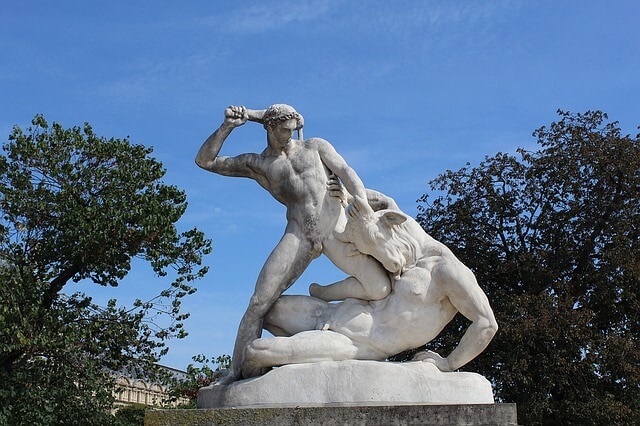
Theseus soon arrived at the heart of the Labyrinth and came upon the Minotaur. The two fought until Theseus eventually overpowered the Minotaur, stabbing it through the throat. Theseus then used his ball of thread to find his way back to the entrance, returning to the palace to rescue all of the Athenians sent as tribute as well as Ariadne and her younger sister.
Theseus and Ariadne
Unfortunately, the story between Theseus and Ariadne doesn’t end well, despite its initial romantic start.
The group sailed to the Greek island of Naxos. But here, Theseus deserts Ariadne. Some sources say that the god Dionysus claimed her as his wife, forcing Theseus to abandon her. However, in other versions, Theseus left her on his own volition, perhaps because he was ashamed to take her to Athens. In any case, Theseus sailed for home.
Theseus as King of Athens
On his way from Naxos, Theseus forgot his promise to his father to change the flag. As a result, when his father saw the ship returning home with a black flag, he believed Theseus was dead and threw himself off a cliff in his grief, thus ending his life.
When Theseus reached Athens, he became its king. He did many great deeds and the city thrived under his rules. One of his greatest contributions to Athens was to unify Attica under Athens.
Theseus and the Centaur
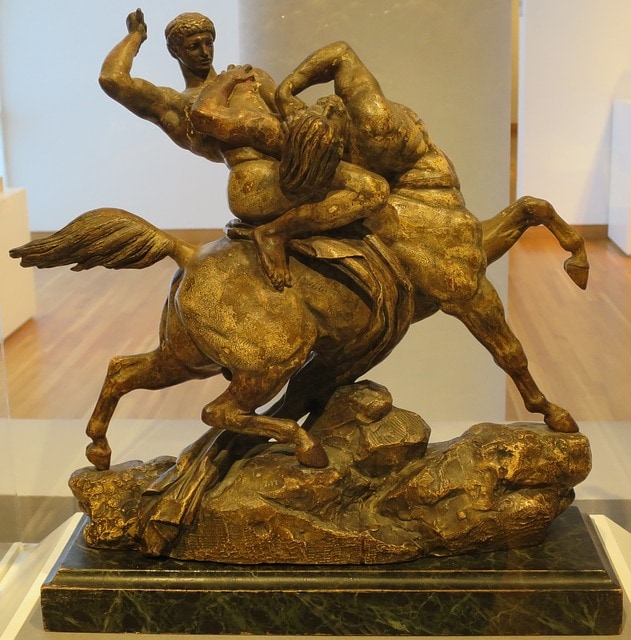
In one version of Theseus’ story, he attends the wedding of Pirithous, his best friend and king of the Lapiths. During the ceremony, a group of centaurs get drunk and rowdy, and a battle between the centaurs and the Lapiths ensues. Theseus springs to action and kills one of the centaurs, known as Eurytus, described by Ovid as “the fiercest of all the fierce centaurs”. This shows Theseus’ bravery, courage and fighting skills.
Theseus’ Journey to the Underworld
Theseus and Pirithous were both the sons of gods. Because of this, they believed they should only have divine wives and they wanted to marry daughters of Zeus. Theseus chose Helen and Pirithous helped him kidnap her. Helen was quite young, around seven or ten, so they intended to keep her captive until she was old enough to marry.
Pirithous chose Persephone, although she was already married to Hades, god of the underworld. Helen was left with Theseus’ mother as Theseus and Pirithous traveled to the underworld to find Persephone. When they arrived, they wandered around Tartarus until Theseus grew tired. He sat upon a rock to rest, but as soon as he sat, he felt his body grow stiff and found he could not stand. Theseus attempted to cry out to Pirithous for help, only to see Pirithous was being tormented by a band of Furies, who led him away for punishment.
Theseus was trapped, sitting immovable, on his rock for months until he was rescued by Heracles, in his way to capture Cerebrus as part of his Twelve Labors. The two of them persuaded Persephone to forgive him for attempting to kidnap her with his friend Pirithous. Eventually, Theseus was able to leave the underworld, but his friend Pirithous was fated to be trapped there for eternity. When Theseus returned to Athens, he discovered that Helen and his mother had been taken to Sparta, and that Athens had been taken over by Menestheus, a new ruler.
The Death of Theseus
Naturally, Menestheus was against Theseus and wanted him killed. Theseus escaped from Athens and sought refuge in Scyros from king Lycomedes. Unbeknownst to him, Lycomedes was a supporter of Menestheus. Theseus believed that he was in safe hands and let his guard down. Lulled into a false sense of security, Theseus took a tour of Scyros with the king, but as soon as they came to a high cliff, Menestheus pushed Theseus off it. The hero died the same death as his father.
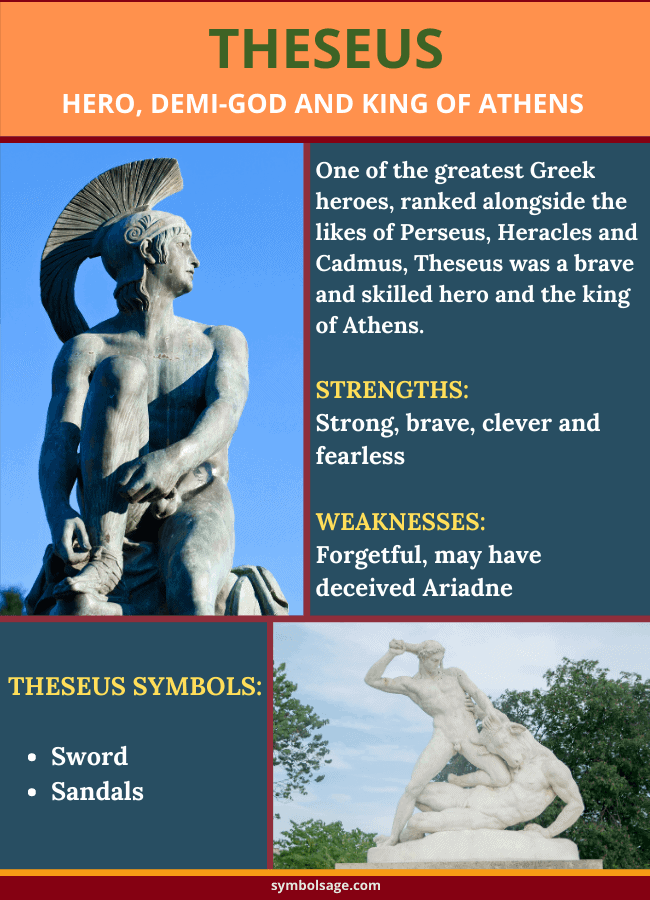
The Children and Wives of Theseus
Theseus’ first wife was an Amazon warrior who was captured and taken to Athens. There is disagreement over whether the warrior in question was Hippolyta or one of her sisters, Antiope, Melanippe, or Glauce. Regardless, she bore Theseus a son, Hippolytus before dying or being killed.
Daughter of King Minos and younger sister of the abandoned Ariadne, Phaedra was Theseus’ second wife. She bore two sons: Demophon and Acamas (who was one of the soldiers who hid in the Trojan Horse during the Trojan War). Unfortunately for Phaedrea, Theseus’ other son, Hippolytus, had scorned Aphrodite to become a follower of Artemis. Aphrodite cursed Phaedra to fall in love with Hippolytus, who could not be with her due to his vow of chastity. Phaedra, upset by Hippolytus’ rejection, told Theseus that he had raped her. Theseus then used one of the three curses given to him by Poseidon against Hippolytus. The curse caused Hippolytus’ horses to become frightened and drag him to his death. Eventually, Artemis told Theseus the truth, promising to avenge his son and her loyal follower by hurting one of Aphrodite’s followers.
Theseus in Modern Times
Theseus’ story has been adapted many times into plays, movies, novels, operas and video games. His ship is also the subject of a popular philosophical question regarding the metaphysics of identity.
The ship of Theseus is a thought experiment that asks whether an object that has had all of its individual components replaces over some period of time is still the same object. This question has been debated as far back as 500 BCE.
Lessons from Theseus’ Story
- Poetic Justice – “Poetic justice” is defined as an outcome in which vice is punished and virtue rewarded usually in a manner peculiarly or ironically appropriate. Throughout Theseus’ six labors, he dispenses poetic justice upon the bandits he encounters. His story is a way of teaching that what you do unto others, will eventually be done unto you.
- The Sin of Forgetfulness – When Theseus sails from Crete back to Athens, he forgets to change the flag he is flying from black to white. By forgetting this seemingly tiny detail, Theseus causes his father to fling himself from a cliff in grief. Even the smallest of details is worth attending to as it can have an enormous outcome.
- Have All the Facts First – When Theseus’ father sees a black flag flying from Theseus’ ship, he does not wait for the ship to return to confirm his son’s death. Instead, he makes an assumption and acts on a situation before he knows all of the facts.
- Keep Your Eye on the Ball – Theseus’ decision to journey into the underworld for a seemingly frivolous reason has dire consequences. Not only does he lose his best friend to the underworld, but he also loses his city. Theseus was distracted by trivial, unimportant factors which lead to dire results. In other words, he takes his eye of the ball.
Wrapping Up
Theseus was a hero and demigod who spent his youth terrorizing bandits and beasts alike. However, not all of his journeys ended well. Despite having a life speckled with tragedy and questionable decisions, Theseus was seen by the people of Athens as a hero and powerful king.




